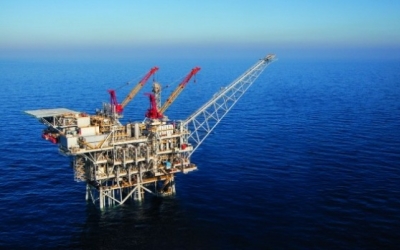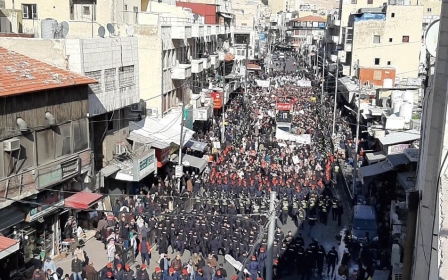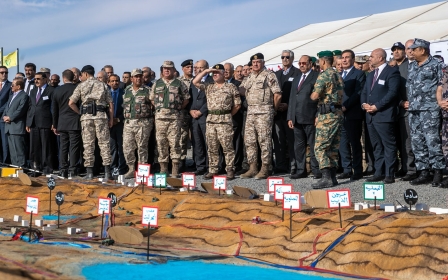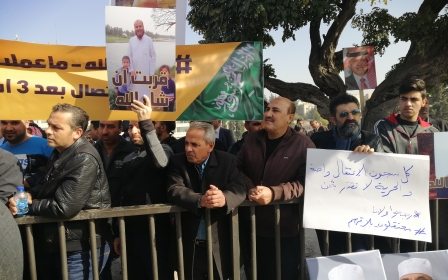Jordanians hit streets for second week calling for end to $10bn Israeli gas deal
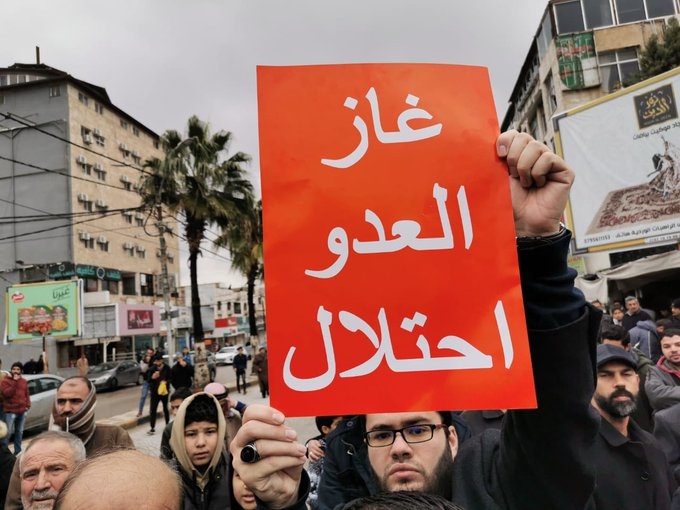
Hundreds of Jordanians protested on Friday calling for the end of a $10bn gas deal with Israel for the second week in a row, local media reported.
In the cities of Amman, al-Zarqa, Irbid, al-Aqaba and al-Karak, protesters demanded that the government end the “treasonous deal” struck in 2016, which saw Jordan start importing gas from Israel’s largest offshore field last week.
Jordanian protestors have told Middle East Eye that they refuse to light their county’s streets with gas "stolen from occupied Palestine".
On 1 January, according to the terms of the deal between Jordan's state-run National Electricity Company (NEPCO) struck with Texas-based Noble Energy and other partners, gas from the offshore Leviathan field first started to be pumped into Jordan for an experimental three-month period.
According to the agreement, Jordan will be supplied with gas from the field for 15 years.
New MEE newsletter: Jerusalem Dispatch
Sign up to get the latest insights and analysis on Israel-Palestine, alongside Turkey Unpacked and other MEE newsletters
The Jordanian government has said the deal will secure stable energy prices for the energy-dependent country for the next decade and could help reduce Jordan's chronic budget deficit, potentially saving Jordan at least $500m annually.
But Jordanians who are protesting reject the deal, saying they resent being forced to deal with a country they still consider an enemy.
Last month, 58 MPs requested an "urgent" draft law be formulated that scrapped the gas deal with Israel, but an MP told MEE that the proposal was deliberately buried.
"The Jordanian regime insists on connecting every Jordanian citizen with the Zionist entity," Jamal Jeet, the spokesperson for the protests told local media.
"We would like to send a message to the regime saying that we refuse this forced normalisation [with Israel] from the north to the south of the country."
Despite frequent protests since 2016 against the importing of Israeli gas, Jordan set aside $15m in its 2018 budget to build a pipeline on Jordanian land.
Israel first discovered gas off its coast a little over a decade ago, but until now, only one field - Tamar - has produced gas for commercial consumption, also for Jordan as part of an earlier deal with the state-owned Arab Potash Company and its affiliate, Jordan Bromine.
The deal for the Leviathan gas is particularly valuable to Noble Energy and Israel's Delek Group, which had yet to produce any gas from the massive offshore field since its discovery in 2010.
Companies typically require agreements to be made in advance of producing gas from fields because they are so expensive to develop, so the Jordan deal would have made further deals on the field more likely.
Middle East Eye delivers independent and unrivalled coverage and analysis of the Middle East, North Africa and beyond. To learn more about republishing this content and the associated fees, please fill out this form. More about MEE can be found here.


